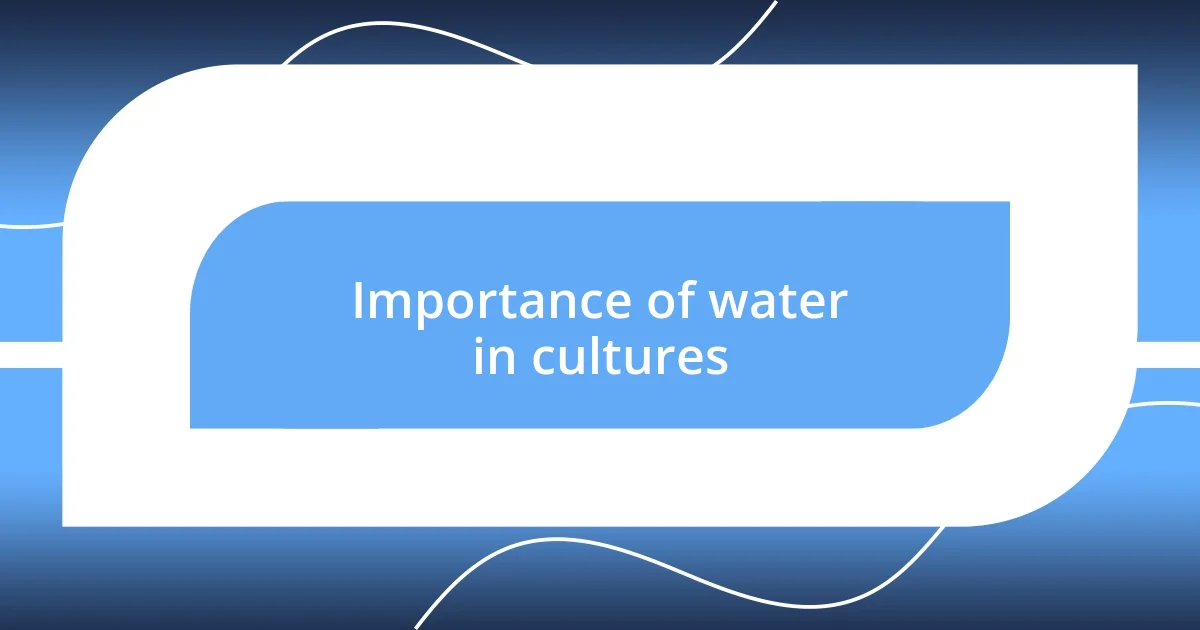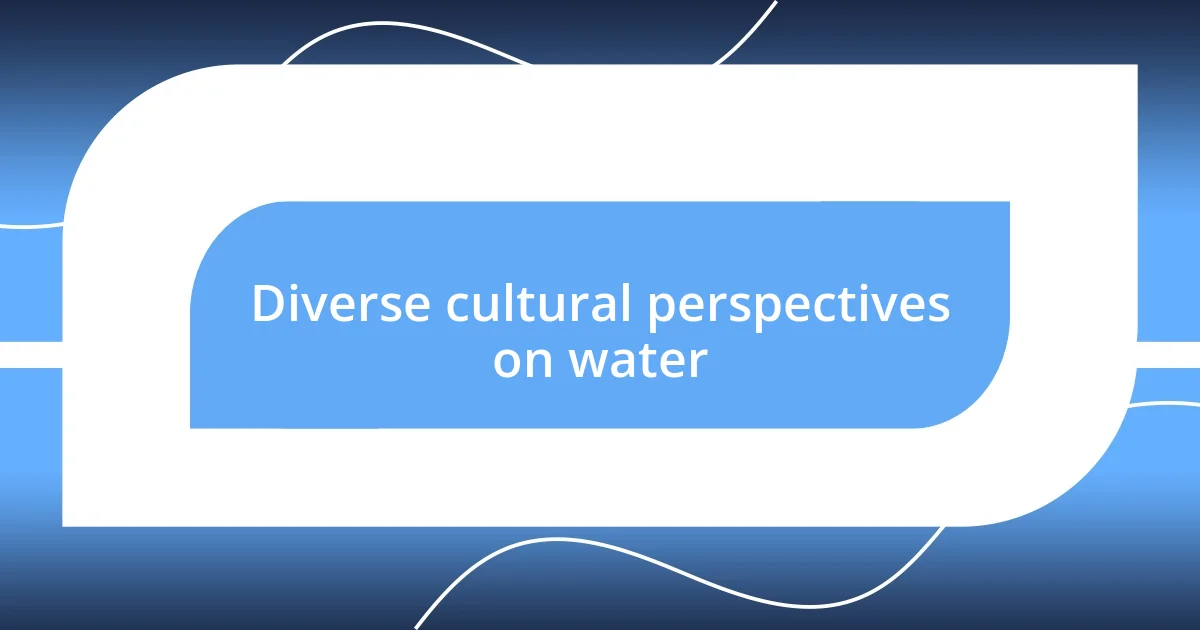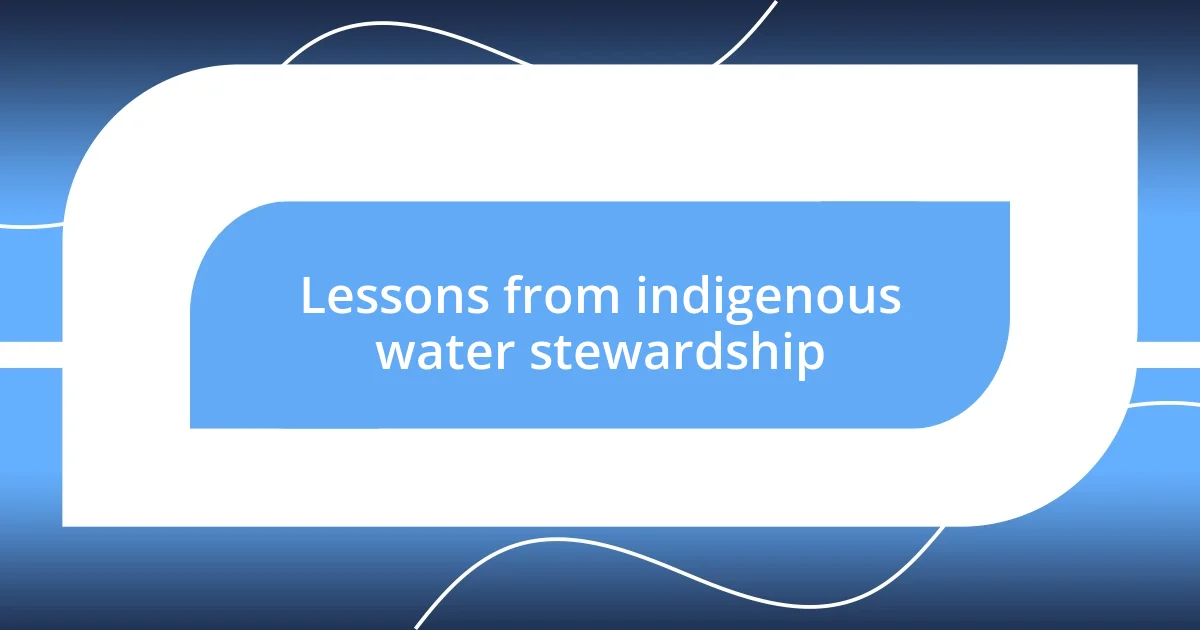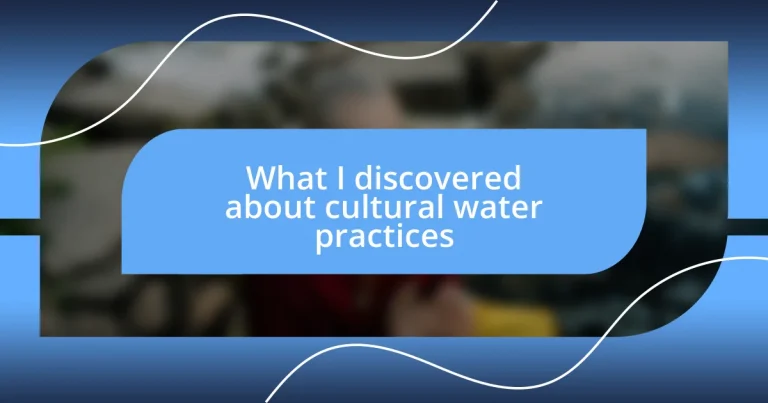Key takeaways:
- Water is celebrated in various cultural practices, symbolizing not only hydration but also spirituality, community bonds, and environmental stewardship.
- Indigenous water stewardship emphasizes respect, reciprocity, and traditional ecological knowledge, highlighting the importance of relationship-building over mere resource management.
- Sustainable water management practices, like rainwater harvesting and collaborative resource allocation, show how communities can effectively address water scarcity while preserving cultural heritage.

Understanding cultural water practices
Cultural water practices are often deeply intertwined with the values and beliefs of a community. I remember visiting a village where water was not just a resource but a sacred element celebrated in rituals. It struck me how people reverently thanked the water during each gathering, reinforcing their connection to nature and each other. Isn’t it fascinating how something as essential as water can become a symbol of respect and unity?
In my travels, I’ve observed that different cultures approach water’s significance from unique angles—some celebrate it with festivals, while others view it as a source of healing. For instance, witnessing a traditional ceremony where elders shared stories while pouring water into a river was transformative. It made me wonder: how often do we reflect on our relationship with water in our day-to-day lives? These experiences reveal that water practices are often about more than just hydration; they encompass spirituality and community bonds.
Delving deeper, I became curious about how these practices shape perceptions of conservation and stewardship. When I participated in a community cleanup effort, it was clear that the locals had a sense of ownership over their water sources. They viewed care for the environment as an extension of their cultural responsibility. This leads me to ask, how can we learn from these practices to foster a greater sense of responsibility toward our own resources? These insights reshape my understanding of cultural water practices as not just traditions but vital ways of engaging with the world.

Importance of water in cultures
Water holds immense importance in cultures around the globe, often serving as the lifeblood of communities. I recall visiting a desert tribe where water was not merely a resource but a cherished element that dictated their way of life. They shared stories of ancestors who discovered hidden springs, and I felt a profound respect for how this liquid shaped not only their survival but their entire identity. It’s interesting to think about how water, in these contexts, becomes a bridge connecting past, present, and future.
- Water as a central figure in myths and rituals, symbolizing purity and renewal.
- Festivals celebrating seasonal changes in water availability, fostering community spirit.
- Traditional medicine practices incorporating water, highlighting its healing properties.
- The role of communal efforts in maintaining and protecting shared water sources.
- The emotional connections formed around water gatherings, strengthening cultural ties.
In every place I’ve explored, I’ve discovered that cultural interpretations of water better reflect a community’s values and challenges. Once, while attending a vibrant festival in a coastal town, I joined locals in a symbolic cleansing ritual, which profoundly moved me. As we washed away the past year’s struggles, I felt a collective hope for renewal and healing—it’s moments like these that remind me how water flows through not just our lands, but also our hearts and stories.

Diverse cultural perspectives on water
Cultural perspectives on water vary widely, reflecting local traditions, beliefs, and environmental contexts. During a visit to a Buddhist temple, I was struck by the serene water gardens designed to symbolize purity and tranquility. Each drop seemed to hold a story of mindfulness and connection, teaching me that water can serve not only to nourish but also to inspire a sense of peace and reflection within one’s life.
In my travels, I’ve encountered communities that celebrate water through vibrant festivals. I once participated in a lively event in a river town where locals carried colorful offerings made of flowers and fruits, expressing gratitude for the life-giving waters. It was an electrifying experience that reinforced my belief that these practices foster a deep sense of community and highlight the collective responsibility we share toward our water sources.
Moreover, I’ve learned that water symbolism plays a crucial role in various spiritual practices. While volunteering in a Native American community, I witnessed how water was used in healing ceremonies. The elders spoke of water as a living entity, deserving respect and care. This experience illuminated my understanding of water not as an object but as a vital participant in our interconnectedness. Such insights make me realize that our cultural frameworks regarding water can actively shape our environmental stewardship.
| Cultural Perspective | Significance |
|---|---|
| Buddhist water gardens | Symbolize purity and mindfulness |
| River town festivals | Celebrate community and gratitude |
| Native American healing ceremonies | View water as a living entity needing respect |

Sustainable water management practices
Sustainable water management practices are emerging as vital solutions, particularly in areas experiencing scarcity. I remember visiting a rural community in South Asia where locals implemented rainwater harvesting techniques to combat their water shortages. It was inspiring to see how they transformed mud rooftops into collection systems, turning a simple act into a resourceful method that preserved their connection to nature while maximizing their water supply.
I also discovered the concept of integrated water resource management during my travels through Mediterranean regions. Here, various stakeholders—farmers, urban planners, and environmentalists—collaborated to ensure that water usage was efficient and equitable. This collaboration demonstrated to me the power of community engagement in sustaining water resources. Have you ever considered how pooling diverse perspectives could enhance environmental practices?
On another occasion, at a coastal village, I witnessed how traditional fishing communities adopted sustainable practices to protect their marine resources. They established seasonal fishing limits guided by ancestral knowledge—a respectful nod to both the environment and their cultural heritage. This blend of history and innovation baffled me; how could we not embrace such synergistic methods more widely? Sustainable water management isn’t just about the present; it’s about nurturing our future.

Lessons from indigenous water stewardship
Indigenous water stewardship teaches us that the relationship with water is built on deep respect and reciprocity. During a visit to a remote First Nation community, I was humbled by their practices of conducting seasonal ceremonies to honor the rivers that sustained them. Seeing how the community engaged in these rituals made me wonder: how often do we take a moment to appreciate the water that supports our own lives? It was a poignant reminder that stewardship is about relationship-building, not just resource management.
One aspect that struck me was the importance of traditional ecological knowledge. While exploring the fishing practices of an indigenous tribe, I discovered how they employed ancient techniques to ensure fish populations thrived. They shared stories of “listening” to the river, paying attention to its rhythms and changes. It left me pondering: what if we all cultivated such sensitivity to our natural surroundings? I realized these lessons extend beyond culture; they’re fundamental to sustainable living.
I also witnessed the communal nature of water management within an indigenous group. They coordinated efforts to protect their aquifers, holding regular meetings to discuss the health of their water sources. This spirit of collective responsibility inspired me—have we fully embraced this kind of unity in our own communities? From my experience, the real lesson here lies in understanding that water stewardship is not just about conserving a resource, but about fostering a sense of kinship with the land and all who inhabit it.














